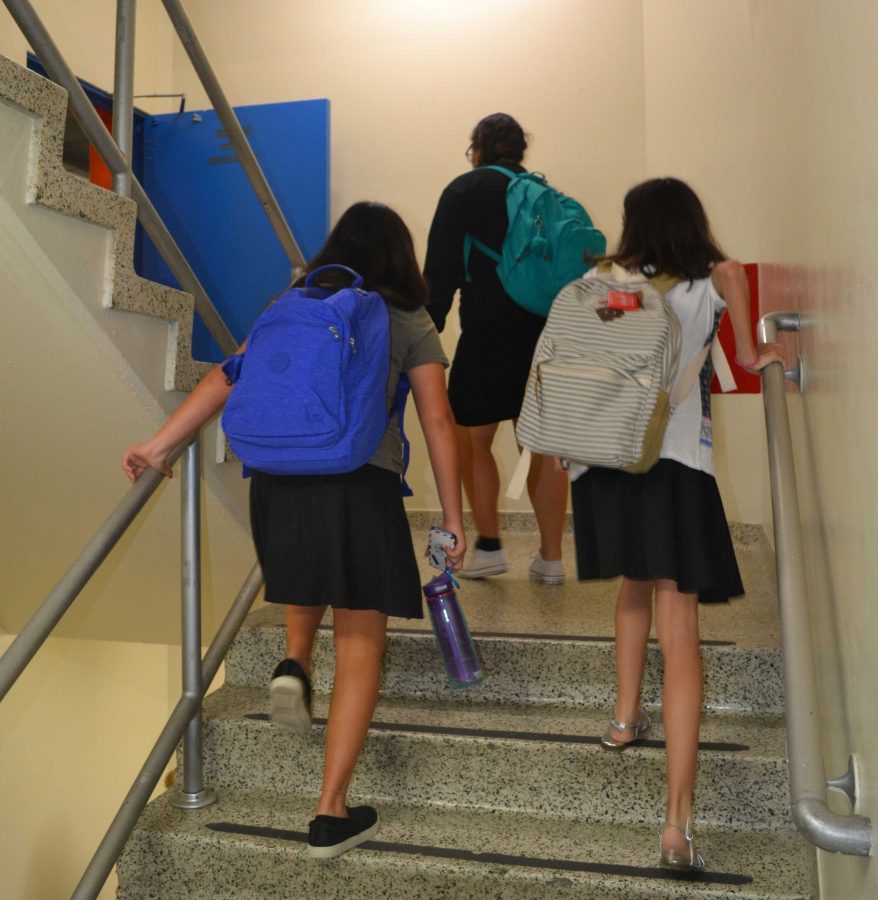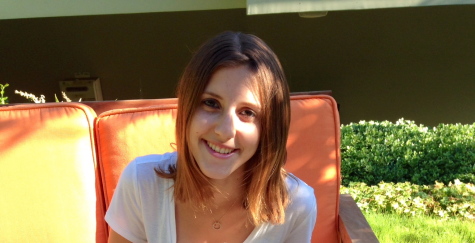Textbook ban lightens backpacks in locker-less JCC — for some
LUG: Students climb stairs to class. The textbook ban hasn’t lightened loads for many.
December 16, 2014
Hoping to make student backpacks lighter, Shalhevet has banned textbooks this year. But some kids are still lugging their bags up the JCC staircase, backs hunched and textbooks held firmly to their chest.
Principal Reb Noam Weissman sent out the new rules via Schoology on Sept. 21, telling students not to carry textbooks in their backpacks and to keep just two notebooks in their bags – one each for General and Judaic studies. He also told teachers to adjust their lesson plans to avoid textbooks, or to photocopy particular pages and chapters if needed.
“We don’t have lockers, so students lugging around 25 pounds of books is not healthy,” said Reb Noam in an interview.
“We are also based a lot on technology, so there are limited reasons why students should need textbooks, especially when most of the readings you can find online. That’s why I am letting the teachers and students know that students are not to bring textbooks to school.”
Teachers have mostly complied. But students still want their books at school so they can work on homework during free periods or at Homework Club after school.
“It’s necessary for me to have my textbooks and other materials in each class so that I know what the teacher is talking about,” said junior Daniella Banafsheha. “It’s just easier to carry everything I need, rather than risk not bringing something and being at a disadvantage in the classroom.”
Around the hallways, most students are just carrying backpacks – in some cases, “rolly” backpacks, which take the weight off of their backs at least when they’re on the third floor. With no elevators at the JCC, wheels do not help get the packs up down the stairs.
Adaptations seem to vary by student.
“I usually bring my textbooks to school because it’s easier,” said sophomore Sarah Yadegari. “However, I just purchased another math textbook—one to keep at home and one to use in class.”
Some students find their backpacks lighter than in previous years.
“We are very technology centered in school,” said junior Daniel Soroudi. “Teachers can easily refrain from giving a heavy loaded backpack.”
But even without books, there are things to lug.
“I’m not carrying my textbooks with me because they are either online or we are supposed to leave them at home,” said sophomore Sabrina Wannon. “However, I still have my English books, journals, notebooks, iPad and computer that I keep in my bag for my classes.”
It’s not that the teachers aren’t trying to limit the weight of students’ bags. Math teachers have bought books for the classroom, Government and science teachers have recommended online textbooks and History teachers do not require students to bring their textbooks to class.
Talmud and Tanach teachers hand out photocopies and many teachers have posted PDFs onto Schoology to limit the books needed for class and to enforce the policy.
“Everything we do in class, I try to make it so that we don’t need the textbook—either by putting it on the board or by making photocopies,” said math teacher Ms. Suzanne Halloran.
Teachers can fill out an order form and ask Stacey Enoch, who works at the front desk, at least two days prior to photocopy the pages.
One department that seems to be sticking with books is, perhaps not surprisingly, the English department. All three teachers are having their students bring paperbacks to class, including Waiting for Godot, Romeo and Juliet and The Crucible – all much smaller and lighter than textbooks.
“In most of my classes, like AP Psych, teachers are following the no textbook rule, which is really helpful,” said junior Liana Taboroki. “For English, I have to bring my books to school, which just creates a heavy backpack and which makes my day more stressful.”
General Studies Principal Mr. Danovitch requires that his British Literature students read physical books instead of on their iPads. He thinks it benefits the students—even if it adds more weight to their backpacks.
“I really don’t think carrying around books creates such a huge burden of weight,” said Mr. Danovitch. “There is also a big difference between students who read on the iPad versus real books. When you read a physical copy of a book, you are engaging with it and annotating it, which creates a better reader and student.”
And in spite of having written the new policy, Reb Noam seemed all right with that.
“If teachers decide not to follow the policy, then that’s really on them,” said Reb Noam. “But we really hope that the culture of our community is that we want the best for them (the students). We don’t ever plan on being draconian.”














